7 of the best face sunscreen buys for year-round skin protection
A beauty expert reviews the best face sunscreens for all skin types to help you find The One—because SPF is an everyday non-negotiable
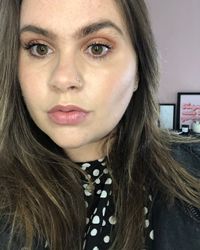
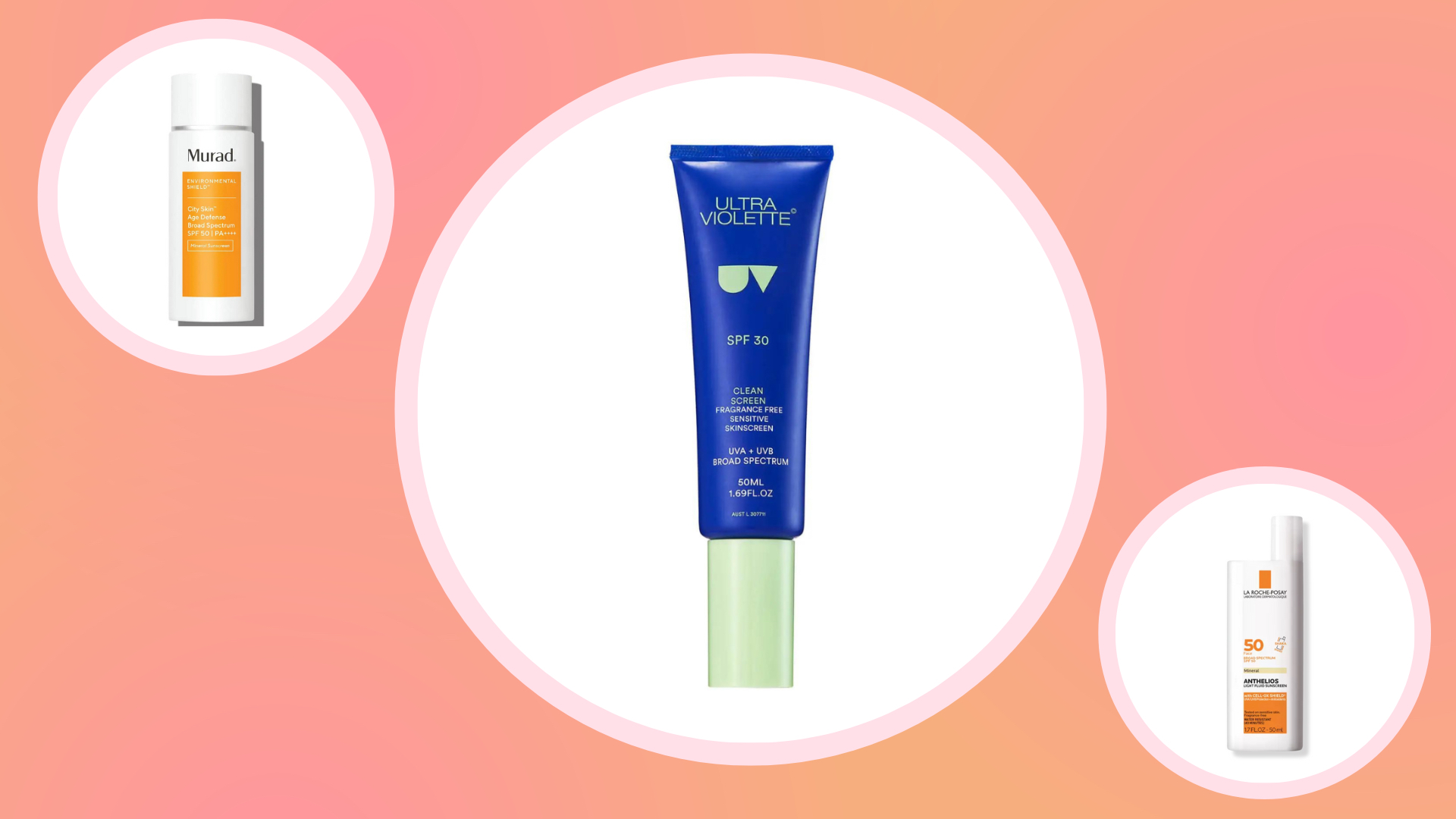
The best face sunscreen should be comfortable to wear, look good on the skin and, most importantly, protect it from the sun—no matter your skin's type or tone. 90% of skin aging is caused by sun damage, so it's a non-negotiable 365 days a year.
In the summer, it's particularly important to reapply it to any exposed area every two hours, especially your face. But it's also a must for your skincare routine on cloudy days or if you're spending the day indoors, as UVA rays can actually pass through both clouds and glass. In other words, if you can see daylight, it can see you.
"Choose a sunscreen with a minimum of SPF 30 and has a UVA symbol too, indicating that it provides broad-spectrum protection," says consultant dermatologist Dr. Justine Kluk. Broad-spectrum means a sunscreen protects against both harmful UVA rays, which cause premature skin aging, and UVB rays, which burn skin and, therefore, as Dr. Kluk puts it, “is important for reducing our risks of skin cancer and premature aging."
"Choose a tinted sunscreen for extended protection against visible light wavelengths, too," she adds. "This is especially relevant if you are prone to dark marks such as melasma or post-inflammatory hyperpigmentation. If you don’t get on well with tinted products some plain sunscreens, such as the Heliocare 360 range, are formulated to give this extra visible light protection, too."
Meet the expert on facial sunscreen
- Dr Justine Kluk is a London-based consultant dermatologist with a particular interest in acne and rosacea. In this guide, she has explained why facial sunscreen is so important and what to look for when shopping for one that'll best suit your skin.
How we tested the best face sunscreen
To cover all bases, our expert beauty tester selected a range of different sunscreens to trial, including options that are recommended by dermatologists and loved by beauty experts, from different price brackets. When testing them, she wore each one for at least three days, and took the following factors into account for her reviews.
- Price
- Packaging
- Formula—mineral, chemical, or a mix of both
- Texture and consistency
- Ease of application
- How it looks and feels on the skin (ideally no trace of it)
- What it looks like 5-10 minutes after applying
- How makeup applies and wears on top of it
- The finish—e.g. matte, dewy, or glowy
For an accurate representation of the market, our tester included both tried-and-tested favorites alongside newer formulas from both high-end and affordable brands. As with our guides to the best retinol serums and best vitamin C serums, we've detailed exactly what each one is like to use and wear, including the pros and cons of each pick, to help you make the right sunscreen choice for you and your skin—including those who follow the best acne skincare routine.
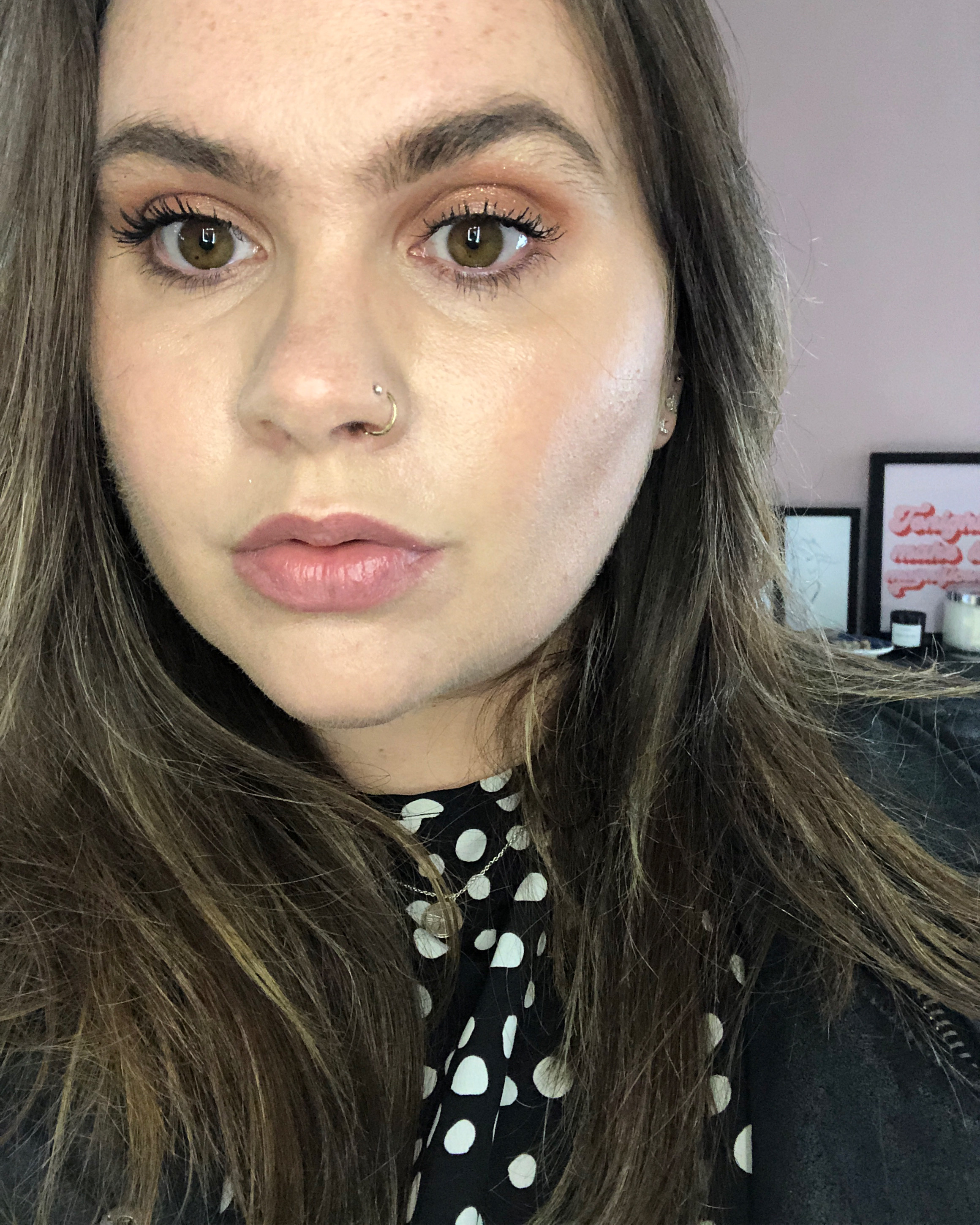
My skin can be sensitive to some ingredients but is generally quite hardy, a bit blemish-prone, and slightly oily. Sunscreen is a forever non-negotiable for me (without it, every other step is pointless) and it has to be lightweight, virtually invisible once applied, and must sit well under makeup. I don’t like anything that I can feel on my skin, and will always lean toward a glow-giving formula over something mattifying.
The best face sunscreen as reviewed by a beauty expert
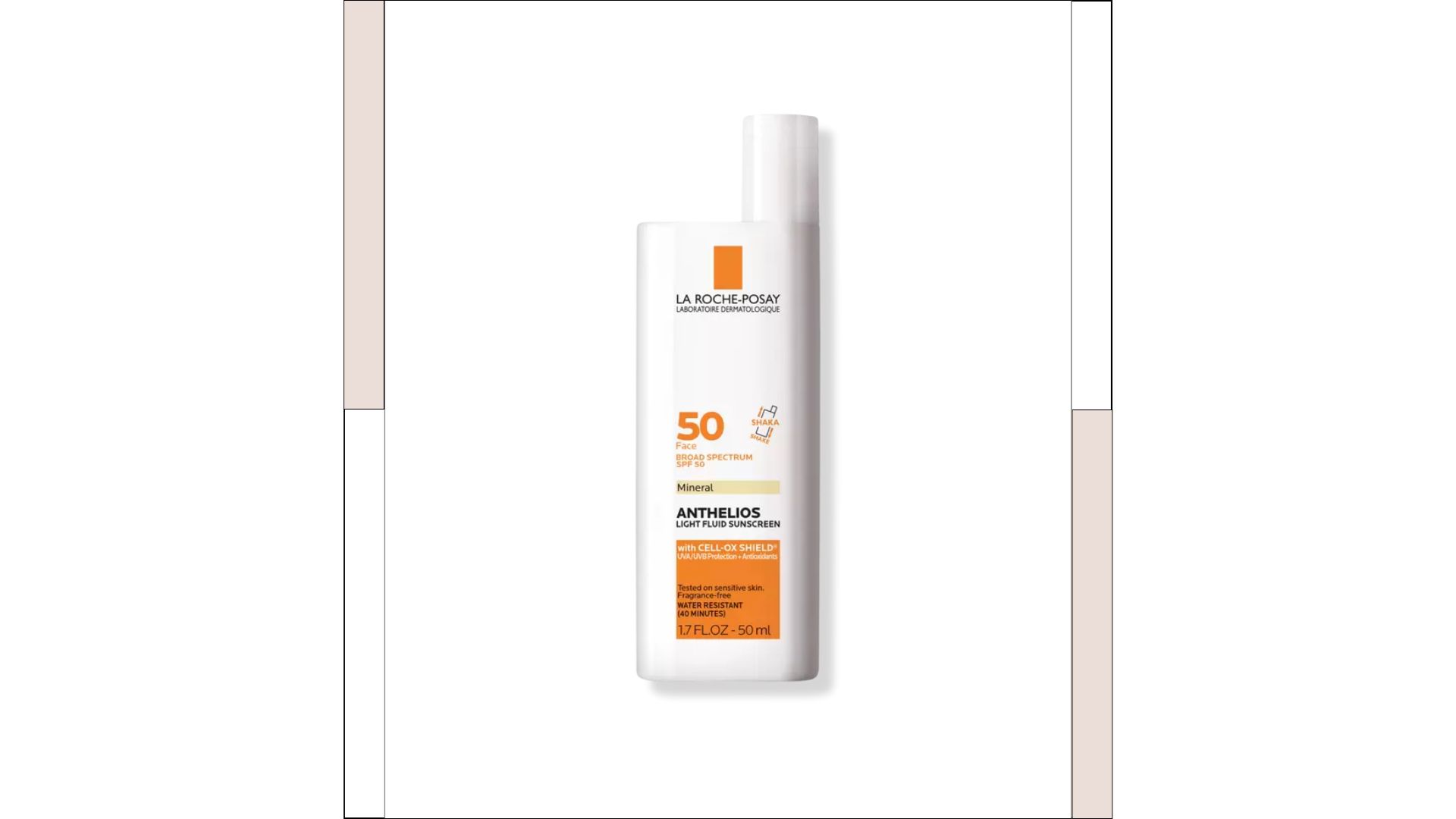
1. La Roche-Posay Anthelios Ultra-Light Fluid Sunscreen SPF 50
Best lightweight facial sunscreen
RRP: $37.99 for 50ml | Mineral or chemical : Mineral | SPF rating: 50 and 60 | Broad spectrum: Yes
La Roche-Posay Anthelios Ultra-Light Fluid sunscreen is a dream to apply. With a super lightweight, unscented formula, it feels as though you're applying a skin-friendly moisturizer rather than sunscreen. The formulas do differ between the US and UK (the latter's offering is chemical), though both are brilliant sunscreens—our testers reviewed the UK's comparable Athelios UVMune 400 Invisible Fluid SPF 50+.
Though it's unscented, I thought it felt far less artificial than other options I've tested. A drawback is that the formula is very thin and can easily run or drip, so it's not one you can spray or place right onto the area you need it. However, this is easily solved by pouring some into your hand before application to manage the flow. After that, it protected my skin well and I felt little to no redness after a day outside.
"This is one of my all-time favorite formulas," agrees My Imperfect Life's deputy editor and in-house beauty expert Aleesha Badkar. "It does come out a little runny, but I quite like the thin texture as it absorbs quickly and doesn't leave a greasy or white cast. It has a kind of blurring effect on my oily, large pore-prone complexion so, for me, gives the impression that I've applied a sheer makeup base, almost like a sunscreen and primer in one." (If you're unsure whether to apply sunscreen or moisturizer first, SPF is always the last step in your regime before makeup.)
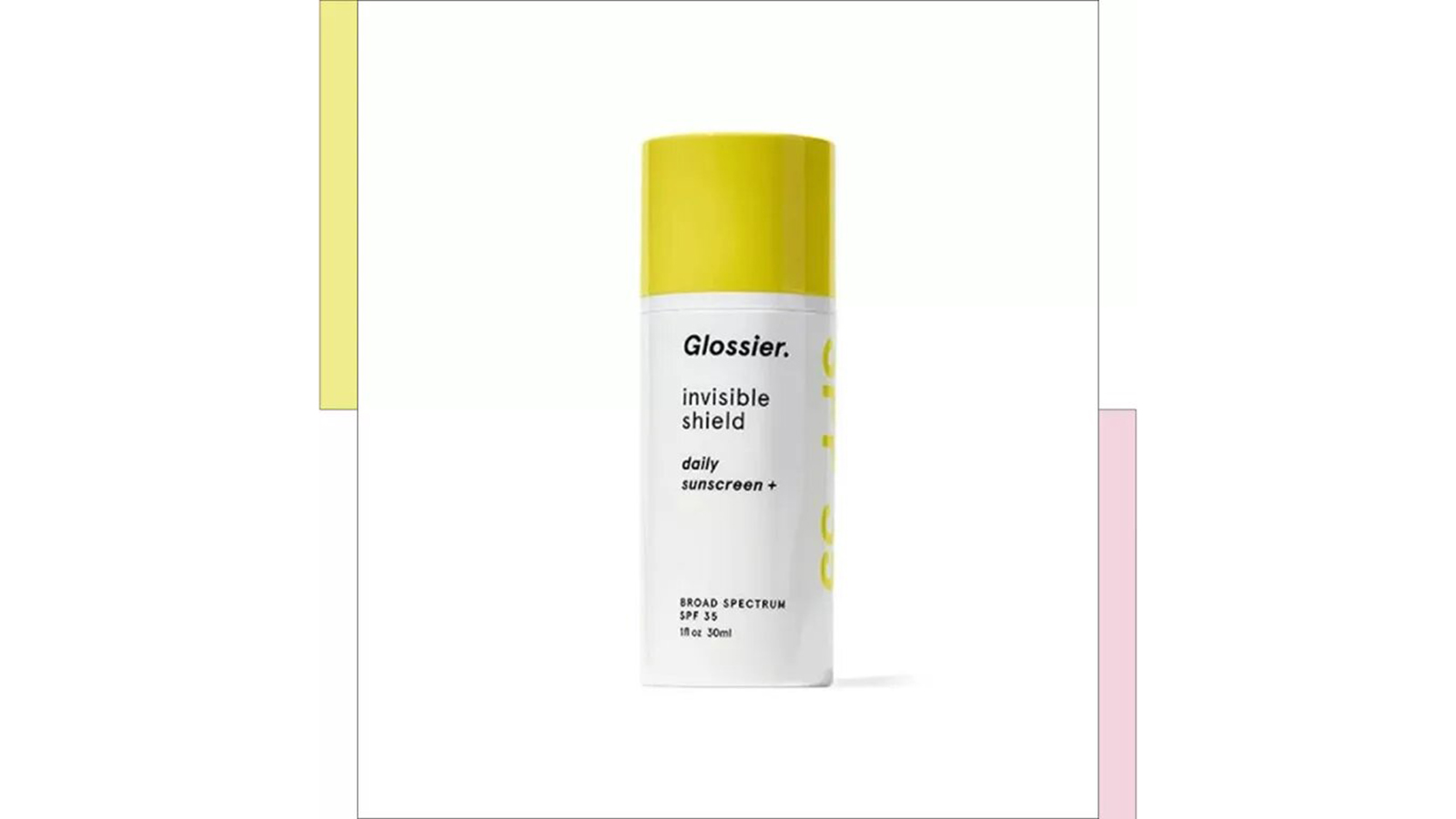
2. Glossier Invisible Shield SPF 35
Best face sunscreen to suit most skin types
RRP: $25 for 30ml | Mineral or chemical: Chemical | SPF rating: 35 | Broad spectrum: Yes
Glossier is one of the few brands that have managed to combine chic packaging with hard-working, effective skincare products, and Invisible Shield is one of its most-loved products. The gel-like formula feels a bit like a serum and is entirely invisible, making it suitable for all skin tones because it doesn't leave a white cast. It’s formulated with "active microcapsules" that instantly absorb into the skin, making it a great makeup base, too.
The one downside to the formula is that it contains fragrance, so worth avoiding for those that have super sensitive skin or know they can be irritated by fragrance. Aleesha actually quite enjoys the scent, however: "It starts my day with a fresh and energizing aroma". Invisible Shield is also great for those with oily- and blemish-prone skin, as it's non-comedogenic—like the best non-comedogenic foundations, it won’t clog pores. It's also vegan and, like all Glossier products, cruelty-free. A must-try for Glossier skincare fans.
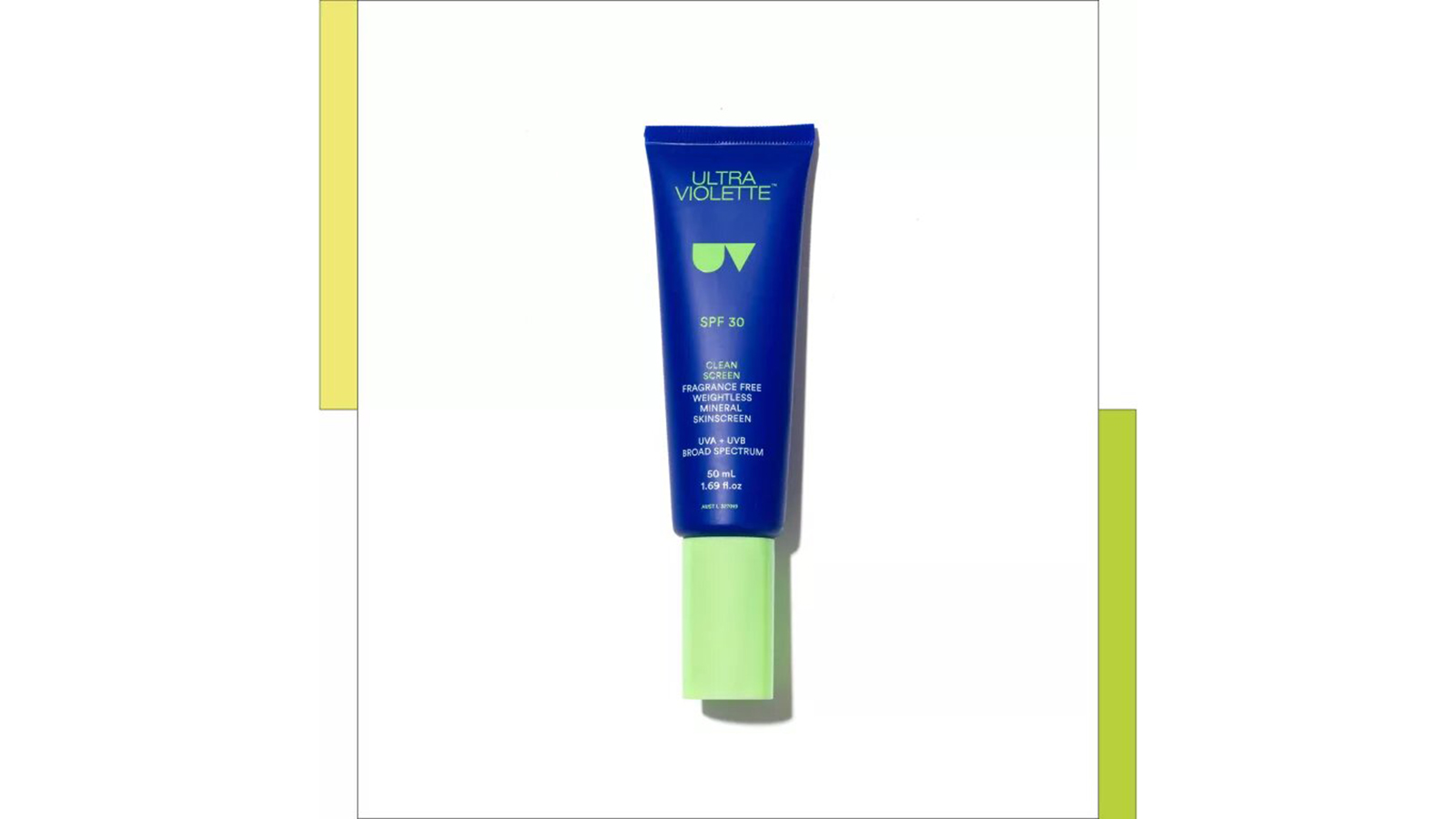
3. Ultra Violette Clean Screen Sensitive Skinscreen SPF 30
Best face sunscreen for sensitive skin
RRP : $35 for 50ml | Mineral or chemical: Both | SPF rating: 30 | Broad spectrum: Yes
Ultra Violette is an Australian sunscreen brand that prides itself on developing "skinscreens"—which, in their words, is a combination of skincare products, like the best vitamin c serums, with sunscreen. Each product is developed with hydrating ingredients that are just as effective as the SPF elements, meaning it’ll work just as hard when it comes to looking after your skin and protecting it against UVA and UVB rays. The result is sunscreen that's comfortable to wear and never a faff to apply.
This one, Clean Screen, is formulated especially for sensitive, reactive, and acne-prone skin. It feels entirely weightless on the skin, is free from both alcohol and fragrance, and promises to help soothe inflammation. I found that it felt really refreshing on the skin, helping to calm any slightly redder areas on my complexion. One small criticism is that it's only available in SPF 30, and SPF 50+ is preferable in the summer months, but it's still great.
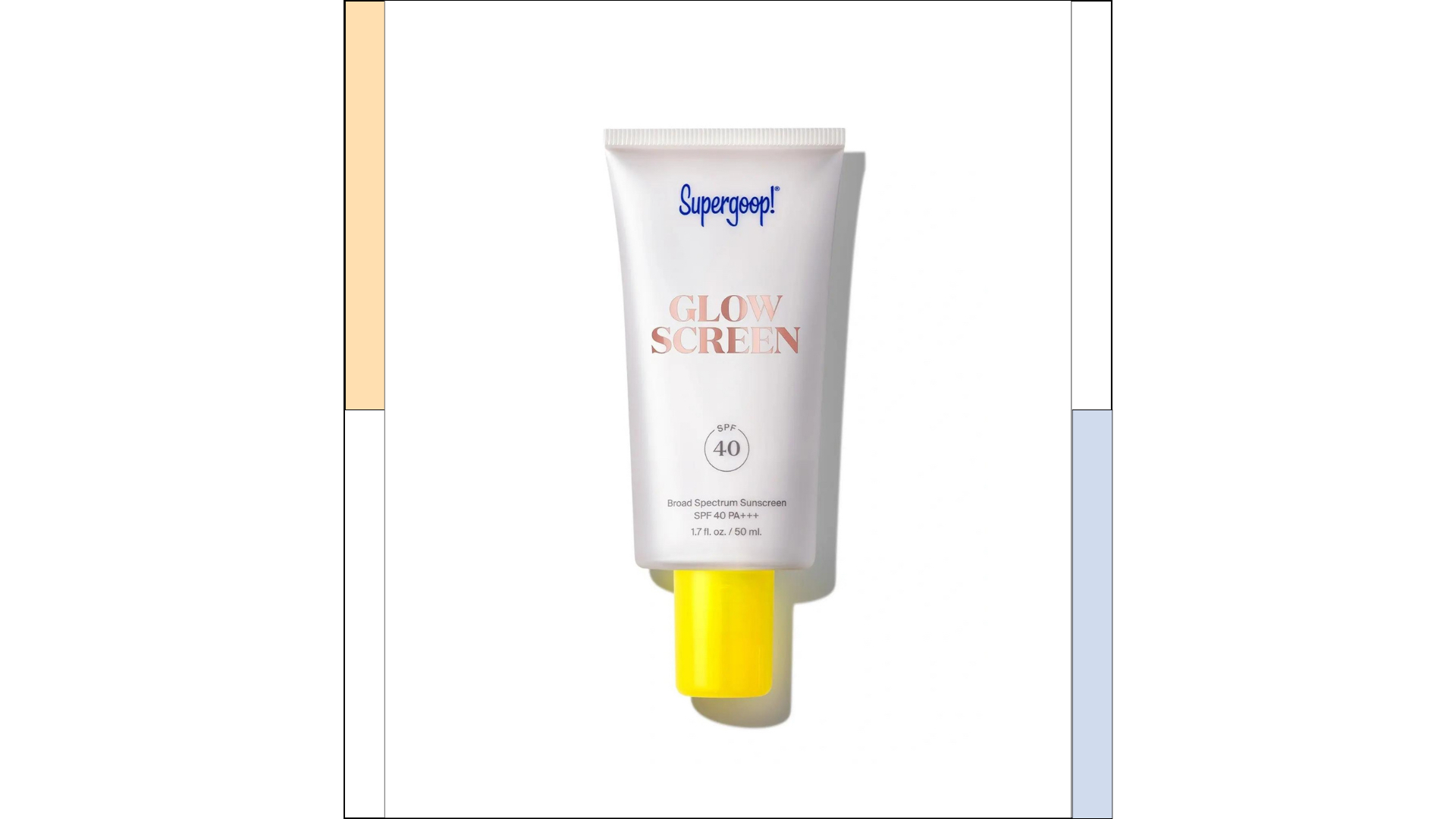
4. Supergoop! Glowscreen SPF 40
Best tinted sunscreen for face with a glowy finish
RRP : $38 for 50ml | Mineral or chemical: Chemical | SPF rating: 40 | Broad spectrum: Yes
Supergoop! is a sunscreen-only brand, meaning it’s spent over 15 years working to really perfect its formulas and make them as cosmetically pleasing as possible. It’s a brand that prides itself on creating different sunscreen formulas for different occasions and skin types. Supergoop! Glowscreen is one of the most popular products within the range, and I can see why.
When testing, I found the formula (which has a slightly lower SPF of 30 in the UK) gave my skin a natural-looking glow and an incredible dewy finish without a speck of glitter in sight—it truly lived up to what it says on the box. It blends in really nicely, doesn’t feel at all like sunscreen on the skin, and instead creates the perfect base for makeup. In short, it’s all but a glow-giving primer with the added benefit of having broad-spectrum sun protection, too. The formula also contains hyaluronic acid to hydrate along with niacinamide to soothe, while added antioxidant protection comes from sea lavender and cocoa peptides. It's a great choice for those who want a sunscreen with multiple benefits.
See our full Supergoop review to read more about the brand's brilliant sunscreen offerings
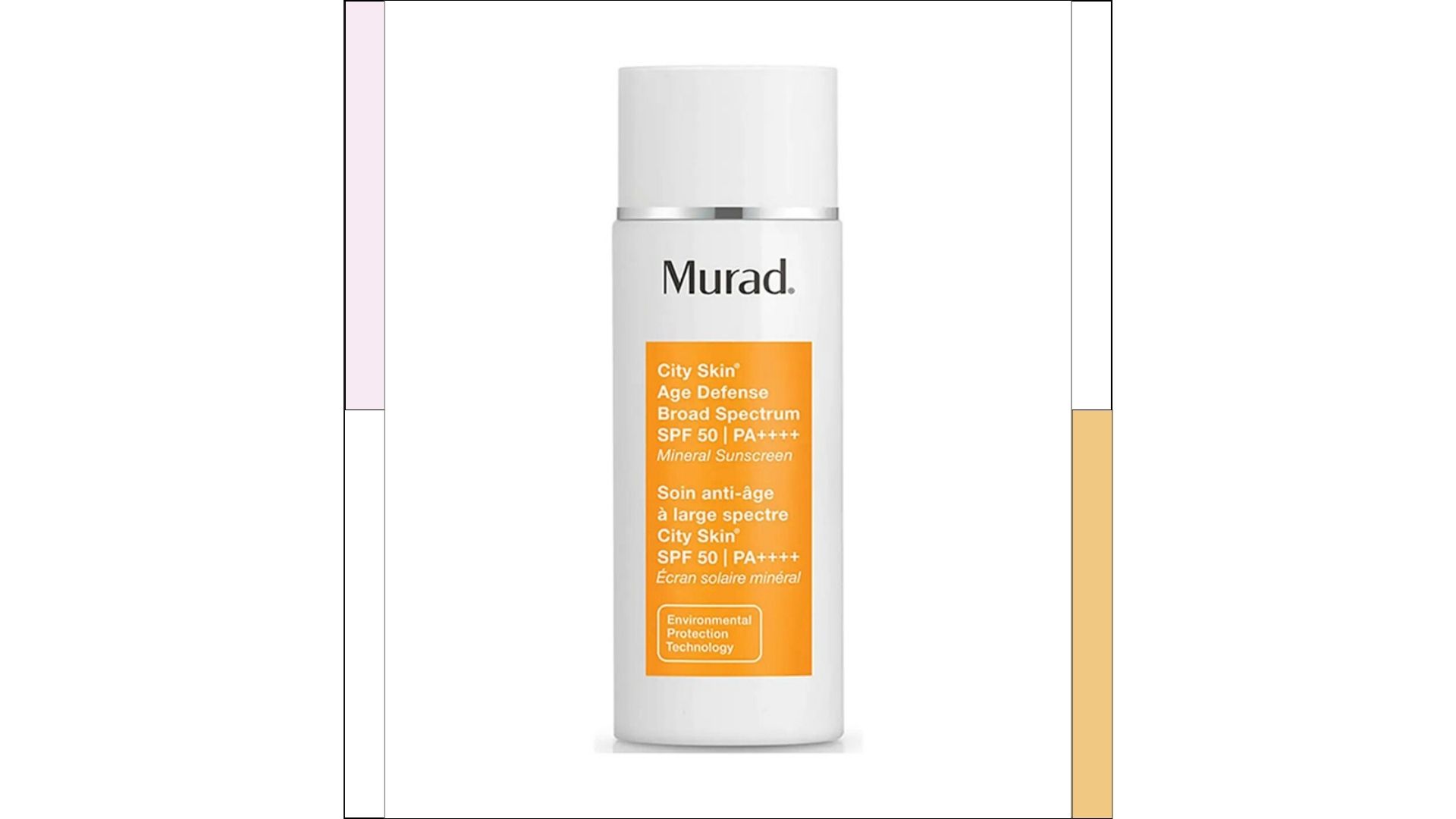
5. Murad City Skin Age Defense Broad Spectrum SPF 50
Best sunscreen for face for city dwellers
RRP : $69 for 50ml | Mineral or chemical: Mineral | SPF rating: 50 | Broad spectrum: Yes
This one is a formula loved by our deputy editor Aleesha, who says: "This is a sunscreen that I have purchased again and again. It's definitely my number one product when it comes to effective, comfortable, and flattering sunscreens for face. Not only does it feature protection against both UVA and UVB rays, it also protects from blue light and—thanks to an infusion of antioxidants—pollution, making it a great option for those who spend all day at a computer screen or a lot of time in the city (hence its name).
"But it's not just the protection that does it for me; I adore how this sunscreen looks and feels. It's easy to apply, as it has a relatively thick consistency, but what I love is that it goes on quite silkily and doesn't feel heavy at all. It feels hydrating and has both a satin feel and look on the skin, making it look almost airbrushed. I have oily skin and love the finish, but any oily skin types who prefer something matte might not love this silky look and feel. You can also tell that this lasts quite long on the skin, as you can almost see it thanks to the primer-like finish. It's definitely one that I can see myself using for years to come."
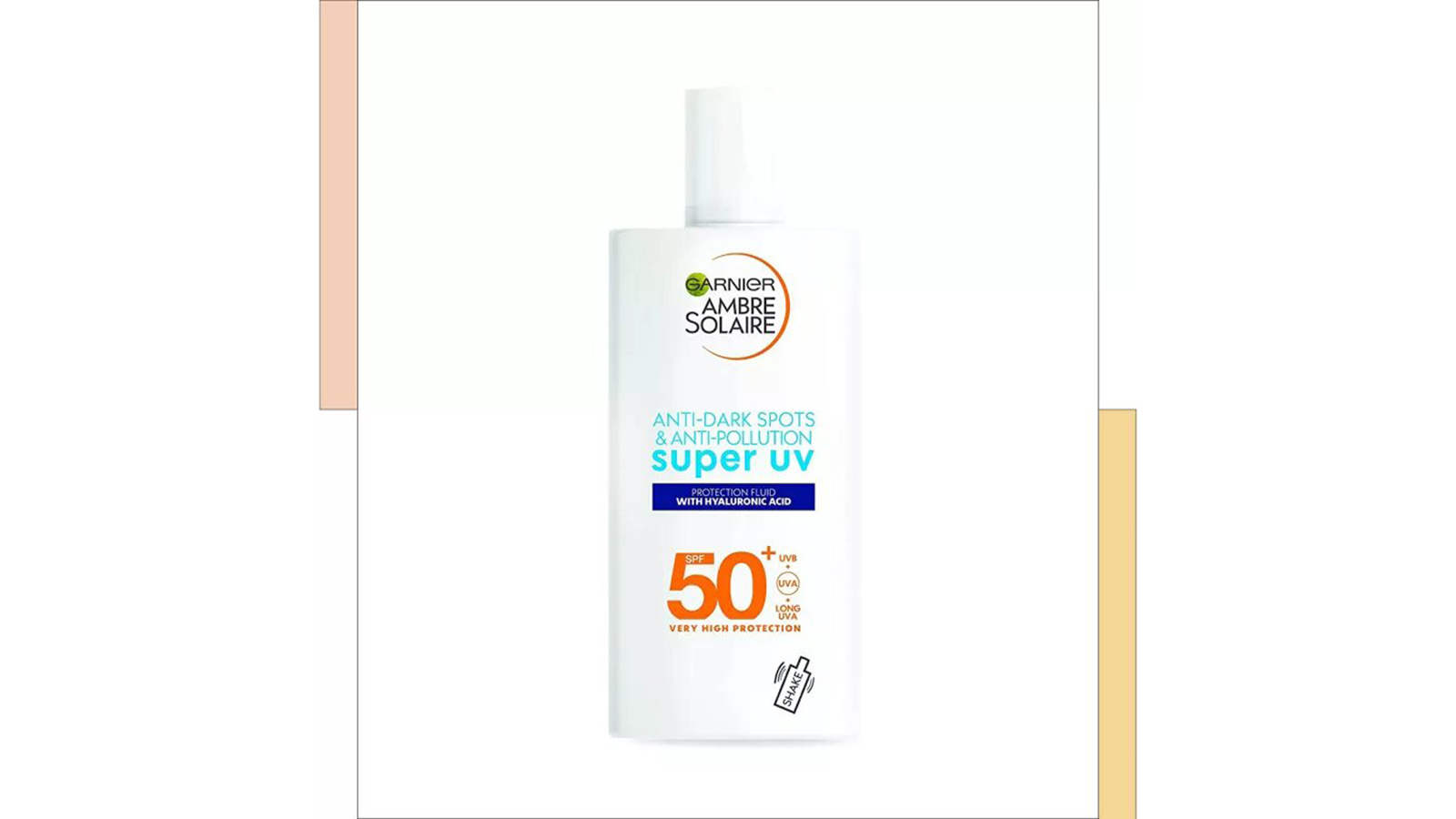
6. Garnier Ambre Solaire Super UV Anti Dark Spots & Anti Pollution Face Fluid SPF50+
Best affordable face sunscreen
RRP : $17 for 40ml | Mineral or chemical: Chemical | SPF rating: 50+ | Broad spectrum: Yes
One of the most affordable and effective daily sunscreens on the market, this ultra-light SPF 50 from Garnier is formulated with hyaluronic acid to help hydrate skin. It also utilizes the antioxidant power of vitamin E for added protection against pollution and other environmental aggressors. When testing, I did find that the formula was fairly runny—more like milk than cream—so be aware of that before you crack yours open.
However, I found that it was easy to apply and when wearing it's virtually invisible, something I always look for in a sunscreen. It sits well under makeup and thanks to the low price point, it’s a great starting point for anybody who’s still yet to make SPF a solid part of their daily routine. It comes in a sizeable bottle, but with daily use you'll easily finish it by its use-by date—for anyone wondering, "does sunscreen expire?". Freelance beauty editor and contributor Lucy Abbersteen agrees that it sinks into the skin brilliantly and, particularly because of its price point, it's a sunscreen she often recommends to friends looking to buy something fairly affordable.
Read our full Garnier SPF 50 review for an in-depth guide to this affordable powerhouse
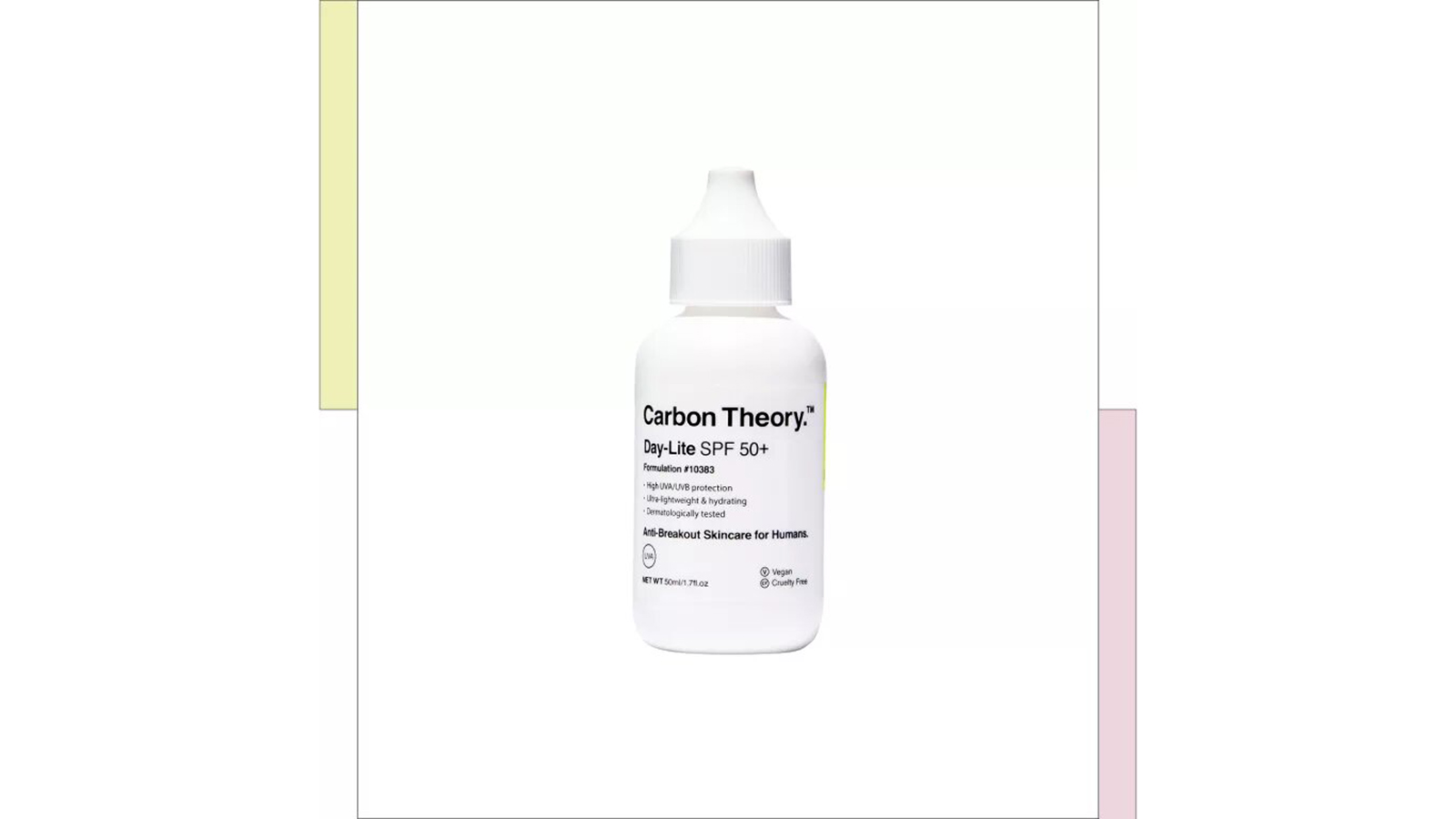
7. Carbon Theory Day-Lite SPF 50+
Best face sunscreen for breakouts
RRP: $18.50 | Mineral or chemical: Chemical | Size: 50ml | SPF rating: 50 | Broad spectrum: Yes
I had big expectations for this one, as Carbon Theory products are well-known for their impressive breakout-busting technology—and after testing, I definitely wasn't disappointed by this new kid on the block. It is formulated with the brand's own formula of SymSave® H, alongside glycerin—both of which work together to calm and soothe sensitive skin and restore its balance in order to protect against irritation.
I found that the formula felt super light, which meant that it glided onto my skin easily and didn't leave it feeling greasy at all. To make sure this washes off effectively, the brand recommends doing a double cleanse as part of your evening skincare routine—especially if you have breakout-prone skin.
How to choose the best sunscreen for face
- Think about your skin type: "If you are prone to spots, opt for a non-comedogenic product where possible, and if you have very oily skin, look for formulas with a mattifying or anti-shine claim," says Dr. Kluk. "For very sensitive or reactive skin, or if you have had difficulty tolerating multiple different sunscreens, you may want to try a mineral/physical sunscreen—and consider seeing a doctor to discuss the possibility of allergy."
- Chemical vs mineral sunscreen: Chemical formulas work by absorbing UV rays, with active ingredients including avobenzone, octinoxate, and oxybenzone. Meanwhile mineral filters, sit on the skin and reflect rays, using active ingredients like . Both are equally effective but, as Dr. Kluk mentioned, some chemical sunscreens can be irritating to very sensitive skin types. "Mineral sunscreens tend to be well tolerated but are often thicker, harder to spread, and more likely to leave a white cast on skin of color," she adds.
- Always use a dedicated sunscreen: Unless you are applying a very large amount of foundation to your face and neck, you won't get the same protection as you will by applying a dedicated facial sunscreen. "Don’t rely on your makeup for sun protection," Dr. Kluk confirms. "Studies have shown that we don’t typically apply our makeup in a thick enough layer to get the SPF on the label."
Lucy Partington has been a beauty journalist for eight years, writing for titles including Stylist and Cosmopolitan. She’s a true skincare nerd who’s on a lifelong quest for a glowing complexion and loves nothing more than learning about new ingredients and products. She’s obsessed with having perfect eyebrows and collecting eyeshadow palettes she’ll probably never use.
- Lucy Abbersteen
- Aleesha BadkarFormer Deputy Editor at My Imperfect Life